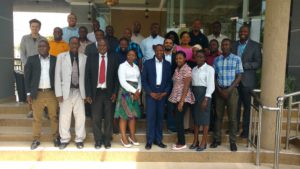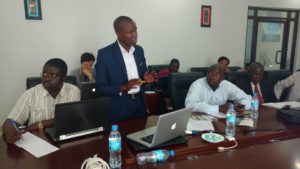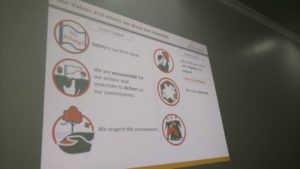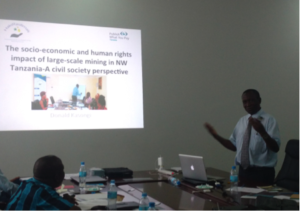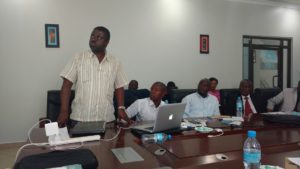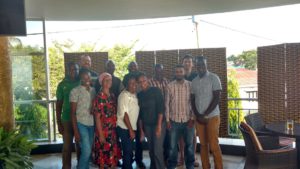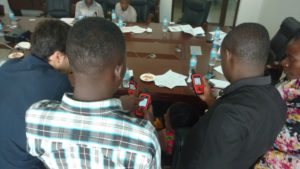On Monday 23 October, IPIS organised a workshop in Mwanza to launch the data collection phase of its mapping project on the socio-economic and human rights impact of mining in northwest Tanzania. This served to introduce the project and obtain additional input and feedback on the most pressing information gaps in the sector.
The workshop was organised for a broad audience of Tanzanian mining and human rights authorities, large-scale mining companies, small-scale miners’ associations and civil society organisations.
Eng. Yahya Ismail Samamba, the Assistant Commissioner for the Western Lake Zone, delivered the Ministry for Minerals’ keynote opening speech. He replaced the Commissioner for Minerals who had to cancel shortly before the event due to other urgent business. Eng. Samamba gave participants an overview of the recent policy and legal changes in the sector and expressed the Ministry’s interest in and support for this much-needed large-scale data collection endeavour. This was followed by an introduction of IPIS, its mapping work and the current project.
These introductions prepared the stage for a first panel on the socio-economic and human rights impact of large-scale mining. This high-level panel was composed of Mr. Manace Ndoroma, Senior Manager Community Affairs of Geita Gold Mine (AngloGold Ashanti), Mr. Albert Kakengi, Mwanza office of the Tanzanian Commission for Human Rights and Good Governance (CHRAGG) and Mr. Donald Kasongi Director of the NGO Governance Links and Chair of the CSO platform on natural resource management in Tanzania, HakiRasilimali. Mr. Ndoroma explained how Geita Gold Mine works to spread the benefits of its operations to adjacent communities. He complemented this with some insights into the challenges and obstacles this brings along with regard to expectation management, communication, and issues of health and safety, particularly in the case of intruders. Mr Kakengi clarified how CHRAGG, as national human rights institution (NHRI), strives to hold perpetrators of (corporate) human rights abuse to account and protect victims. He instructed participants on CHRAGG’s reporting mechanisms and its framework of analysis in approaching such reports. Finally, Mr Kasongi enlighted the civil society perspective on the matter. He elucidated how civil society in Tanzania works to improve the governance and impact of the extractive sector through a combination of policy analysis, research, advocacy, awareness-raising, fact-finding, and support to local communities.
The panel was wrapped up with a Q&A session wherein participants inquired about and drew attention to the necessity for companies to improve their track record on both socio-economic and human rights indicators, the importance of raising awareness on existing reporting and grievance mechanisms, the often absent voice and perspective of local communities in relevant policy discussions and the need for better data on all these aspects to feed into the public debate and ensure evidence-based policy and law-making.
In-between the panel sessions IPIS presented the findings from its scoping missions to the project’s four focal regions, namely Geita, Kigoma, Shinyanga and Mara. Among the main challenges identified by IPIS are land disputes, lack of equipment causing early abandonment of productive mines, wide-scale use of toxic mercury by small-scale gold miners, deforestation, water, soil and noise pollution, lack of dialogue and tensions between large-scale miners and local communities, poor and insecure working conditions, child labor, and discrimination of women in this male-dominated industry.
The second and final panel focussed on the socio-economic and human rights impact of artisanal and small-scale mining (ASM). It was composed of Mr. Milele Mundeba, secretary of the Mara Region Miners’ Association (MAREMA) and Ms Esther Masawe, programs officer of the civil society organisation Action for Democracy and Local Governance (ADLG). A representative from the small-scale mining division of Tanzania’s State Mining Corporation (STAMICO) was unfortunately prevented from attending due to unforeseen events. Mr. Mundeba presented how small-scale mining contributes to local development, despite the substandard access to finance, geological information, equipment and market access. The lack of an overarching regulatory framework gives, however, rise to severe human rights concerns due to its often uncontroled impact on the environment, women’s and children’s rights and health and safety. Ms Masawe echoed many of these challenges and explained how ADLG strives to mitigate them through community dialogue and awereness-raising.
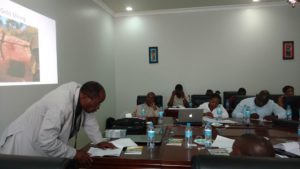 Other participants pointed to the need for a comprehensive approach to end the harmful impact of ASM and fully exploit its potential for community-wide socio-economic advancement. The information gaps appeared to be even more striking in this area, as little to no concrete data is available on the nature, scope and impact of ASM. The most pressing information needs put forward relate to the size of the small-scale mining sector, its modus operandi and level of mechanisation, the role of women in mining, child labour, the scope and nature of mercury usage in gold processing, and the number and causes of accidents.
Other participants pointed to the need for a comprehensive approach to end the harmful impact of ASM and fully exploit its potential for community-wide socio-economic advancement. The information gaps appeared to be even more striking in this area, as little to no concrete data is available on the nature, scope and impact of ASM. The most pressing information needs put forward relate to the size of the small-scale mining sector, its modus operandi and level of mechanisation, the role of women in mining, child labour, the scope and nature of mercury usage in gold processing, and the number and causes of accidents.
This workshop was followed by a 4-day training for 9 selected civil society surveyors and a representative from the Ministry of Minerals on mobile data collection in the small-scale mining sector. This started with an in-depth session by Mr. Frederick Mangasini from the Mineral Resources Institute (MRI) on the geology of northwest Tanzania, including insights on exploitation types, mining and processing equipment, as well as issues of health and safety on mine sites. Subsequent sessions included interactive discussions on the various indicators covered in the questionnaires, the ins and outs of surveying mine sites, mobile data collection, satellite communication, taking field notes, and qualitative post-mission reporting. IPIS also took the time to instruct surveyors on how to use mobile data collection in the work of their own organisations. It taught them how to design their own mobile questionnaires and data collection strategies.
IPIS is now adding the diverse input it received throughout the workshop and training to the multiple stakeholder consultations it had already undertaken in the preparatory phases of the project. This makes it possible to finalise the questionnaires in a manner that will allow IPIS to collect relevant, detailed and structured information on the various positive and negative impacts of mining in the four focal regions. IPIS is happy to have trained this new pool of strong surveyors that will undertake the challenging data collection exercise between November 2017 and February 2018.

